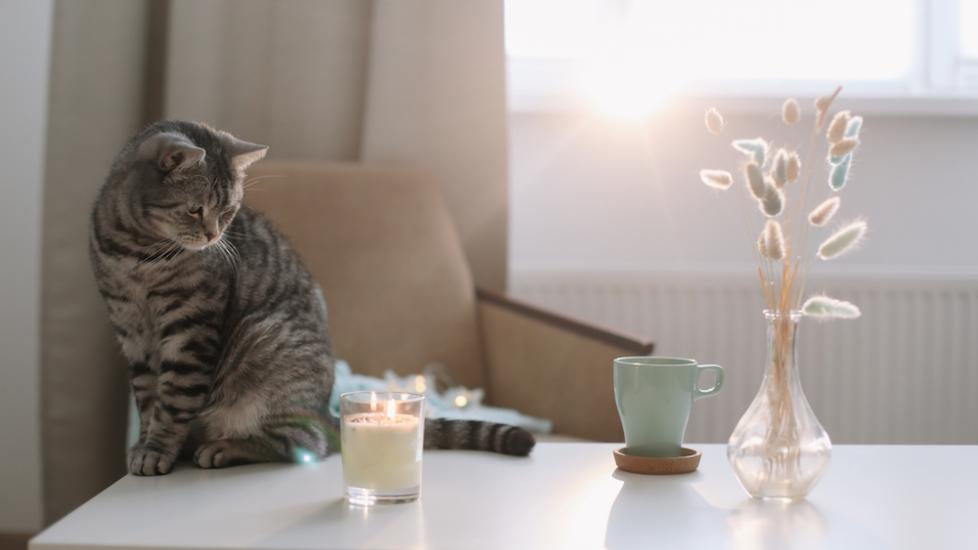Are Essential Oils Safe for Cats?
While essential oils may help people lift their mood, make their home smell nice, or even help ease various medical symptoms, they are not safe for your cat and are even potentially toxic. In general, it is not recommended to use essential oils on or near your cat.
Cats are highly susceptible to getting sick from breathing in essential oils via your home diffuser, and vapor from the oils can get onto their skin as well.
Cats are expert self-groomers, and if they lick essential oil residue off their skin, it can poison them or cause serious signs of illness. Some oils are more dangerous than others, but if your cat comes in contact with them through their skin or air, they should be observed very carefully and taken to a veterinarian as soon as possible if they show any signs of illness.
Health Tools
Not sure whether to see a vet?
What Are Essential Oils?
While some essential oils have been used as herbal remedies for hundreds of years, the FDA has not approved them for therapeutic use in people or pets. Essential oils are commonly used for aromatherapy, a form of alternative medicine that uses smell to improve your health, or by applying them directly to the skin. Studies have shown that in humans, essential oils may help boost mood or reduce stress, among other health benefits.
It is a common misconception that because essential oils come from plants, they must be safe, when in fact many of them are toxic. These oils are made from highly concentrated plant extracts. They are made by pressing, distilling with water/steam, or heating up various parts of a plant (flower, bark, seeds, leaves, or fruit) to obtain a concentrated liquid that often has a pleasant smell.
Are Essential Oils Safe for Cats?
Essential oils are not safe for cats and can quickly cause toxicity, as they are rapidly absorbed both by mouth and through the skin, where they accumulate in the liver. Cats do not have the liver enzymes needed to break down the oils so they can be eliminated safely from the body. These toxic oils then build up in your cat's bloodstream, causing toxicity.
It's important to also remember that the higher the oil concentration, the more harmful it is to your cat. When essential oils are used for aromatherapy, they are often placed in a diffuser to be aerosolized throughout a room or home. This causes the oils to land on the skin or inhaled. When a cat breathes in these concentrated fumes, it can irritate the lining of their respiratory tract, including the lungs, in addition to building up in the liver and causing toxicity.
Oils in the air pose the greatest threat to cats that have asthma or heart disease. Sometimes these conditions will be minor and underlying, but exposure to toxic fumes can heighten these conditions, causing your cat to cough excessively or even have trouble breathing.
If you cat is taking more than 40 breaths per minute, breathing with their mouth open, has purple gums, or is showing any other abnormal breathing, they should be seen by a veterinarian as soon as possible, as it could be a life-threatening emergency.
Candles, potpourri, and room sprays containing essential oils can also cause serious illness to cats.
Which Essential Oils Are Toxic to Cats?
Although toxicity can occur from any essential oils, the following are known to cause serious poisoning in cats:
-
Wintergreen
-
Oil of sweet birch
-
Citrus oil
-
Pine oil
-
Ylang-ylang oil
-
Peppermint oil
-
Cinnamon oil
-
Pennyroyal oil
-
Clove oil
-
Eucalyptus oil
-
Tea tree oil
-
Lavender oil
If you choose to use an essential oil on your body or via a diffuser in your home, all pets in the house should be quarantined to a room where they are not exposed to it.
Access to fresh air is essential to your cat’s health in a home where essential oils are used. If you have these oils on your body, it’s advised to avoid contact with your cat until it is fully absorbed and no longer has an odor.
Ideally, these oils should never be used in a house where cats (and other susceptible pets like dogs, birds, hamsters, guinea pigs, rabbits, or reptiles) reside.
What To Do If Your Cat Gets Into Essential Oils
Animals should not be kept in confined spaces where essential oil diffusers are in use. Exposure to concentrated essential oils is much more dangerous and should be avoided at all costs in or around your cat.
Essential oils should never be applied to your cat’s skin for any reason. If your cat has been exposed to essential oils, it should immediately be moved to an area of fresh air. If your cat is having any trouble breathing and acting unusual, call your veterinarian immediately.
Do not bathe your cat if the essential oils are exposed to their skin. It’s possible that certain soaps and cleansers can make the problem worse. If your cat is having any symptoms of essential oil toxicity, they should be examined by their veterinarian or an emergency veterinarian as soon as possible.
Symptoms that arise from essential oil toxicity in cats vary greatly, depending on which oil is used and your cat’s current medical history. They often include drooling, vomiting, tremors, unsteady gait while walking, lethargy, or respiratory distress.
Those symptoms may cause your cat to have trouble regulating their heart rate and body temperature. If the oils were ingested, your cat may experience vomiting, diarrhea, and depression as common symptoms. The most serious consequence in cats exposed to essential oils is the development of breathing troubles and/or liver failure. Both conditions can be fatal.
Featured Image: iStock.com/Galina Kondratenko
